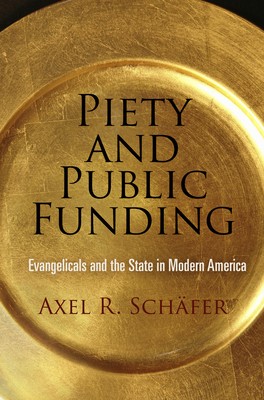
- We will send in 10–14 business days.
- Author: Axel R Schäfer
- Publisher: University of Pennsylvania Press
- ISBN-10: 0812244117
- ISBN-13: 9780812244113
- Format: 15.5 x 23.1 x 3.1 cm, hardcover
- Language: English
- SAVE -10% with code: EXTRA
Reviews
Description
How is it that some conservative groups are viscerally antigovernment even while enjoying the benefits of government funding? In Piety and Public Funding historian Axel R. Schäfer offers a compelling answer to this question by chronicling how, in the first half century since World War II, conservative evangelical groups became increasingly adept at accommodating their hostility to the state with federal support.
Though holding to the ideals of church-state separation, evangelicals gradually took advantage of expanded public funding opportunities for religious foreign aid, health care, education, and social welfare. This was especially the case during the Cold War, when groups such as the National Association of Evangelicals were at the forefront of battling communism at home and abroad. It was evident, too, in the Sunbelt, where the military-industrial complex grew exponentially after World War II and where the postwar right would achieve its earliest success. Contrary to evangelicals' own claims, liberal public policies were a boon for, not a threat to, their own institutions and values. The welfare state, forged during the New Deal and renewed by the Great Society, hastened--not hindered--the ascendancy of a conservative political movement that would, in turn, use its resurgence as leverage against the very system that helped create it. By showing that the liberal state's dependence on private and nonprofit social services made it vulnerable to assaults from the right, Piety and Public Funding brings a much needed historical perspective to a hotly debated contemporary issue: the efforts of both Republican and Democratic administrations to channel federal money to faith-based organizations. It suggests a major reevaluation of the religious right, which grew to dominate evangelicalism by exploiting institutional ties to the state while simultaneously brandishing a message of free enterprise and moral awakening.EXTRA 10 % discount with code: EXTRA
The promotion ends in 16d.21:00:37
The discount code is valid when purchasing from 10 €. Discounts do not stack.
- Author: Axel R Schäfer
- Publisher: University of Pennsylvania Press
- ISBN-10: 0812244117
- ISBN-13: 9780812244113
- Format: 15.5 x 23.1 x 3.1 cm, hardcover
- Language: English English
How is it that some conservative groups are viscerally antigovernment even while enjoying the benefits of government funding? In Piety and Public Funding historian Axel R. Schäfer offers a compelling answer to this question by chronicling how, in the first half century since World War II, conservative evangelical groups became increasingly adept at accommodating their hostility to the state with federal support.
Though holding to the ideals of church-state separation, evangelicals gradually took advantage of expanded public funding opportunities for religious foreign aid, health care, education, and social welfare. This was especially the case during the Cold War, when groups such as the National Association of Evangelicals were at the forefront of battling communism at home and abroad. It was evident, too, in the Sunbelt, where the military-industrial complex grew exponentially after World War II and where the postwar right would achieve its earliest success. Contrary to evangelicals' own claims, liberal public policies were a boon for, not a threat to, their own institutions and values. The welfare state, forged during the New Deal and renewed by the Great Society, hastened--not hindered--the ascendancy of a conservative political movement that would, in turn, use its resurgence as leverage against the very system that helped create it. By showing that the liberal state's dependence on private and nonprofit social services made it vulnerable to assaults from the right, Piety and Public Funding brings a much needed historical perspective to a hotly debated contemporary issue: the efforts of both Republican and Democratic administrations to channel federal money to faith-based organizations. It suggests a major reevaluation of the religious right, which grew to dominate evangelicalism by exploiting institutional ties to the state while simultaneously brandishing a message of free enterprise and moral awakening.

Reviews